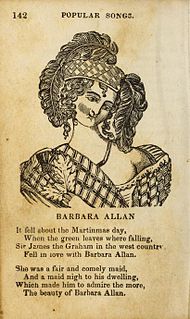
Joan Chandos Baez is an American singer, songwriter, musician, and activist. Her contemporary folk music often includes songs of protest and social justice. Baez has performed publicly for over 60 years, releasing over 30 albums. Fluent in Spanish and English, she has also recorded songs in at least six other languages.

"Barbara Allen" is a traditional folk song once popular throughout the English speaking world. It tells how the eponymous character denies a dying man's love then dies of grief soon after his untimely death.

Another Side of Bob Dylan is the fourth studio album by American singer and songwriter Bob Dylan, released on August 8, 1964, by Columbia Records.
"Lily of the West" is a traditional British and Irish folk song, best known today as an American folk song, listed as number 957 in the Roud Folk Song Index. The American version is about a man who travels to Louisville and falls in love with a woman named Mary, Flora or Molly, the eponymous Lily of the West. He catches Mary being unfaithful to him, and, in a fit of rage, stabs the man she is with, and is subsequently imprisoned. In spite of this, he finds himself still in love with her. In the original version, the Lily testifies in his defense and he is freed, though they do not resume their relationship.
"John Riley" is a traditional English folk song. It is also known as "Johnny Riley", "The Broken Token" and "A Fair Young Maid All in Her Garden", among other titles.

"Seven Drunken Nights" is a humorous Irish folk song most famously performed by The Dubliners. It is a variation of the Scottish folk song "Our Goodman". It tells the story of a gullible drunkard returning night after night to see new evidence of his wife's lover, only to be taken in by increasingly implausible explanations.
"Fare Thee Well" is an 18th-century English folk ballad, listed as number 422 in the Roud Folk Song Index. In the song, a lover bids farewell before setting off on a journey, and the lyrics include a dialogue between the lovers.
"The Unquiet Grave" is an English folk song in which a young man mourns his dead love too hard and prevents her from obtaining peace. It is thought to date from 1400 and was collected in 1868 by Francis James Child, as Child Ballad number 78. One of the more common tunes used for the ballad is the same as that used for the English ballad "Dives and Lazarus" and the Irish pub favorite "Star of the County Down".
"The Water Is Wide" is a folk song of Scottish origin. It remains popular in the 21st century. Cecil Sharp published the song in Folk Songs From Somerset (1906).
"Streets of Laredo", also known as the "Cowboy's Lament", is a famous American cowboy ballad in which a dying cowboy tells his story to another cowboy. Members of the Western Writers of America chose it as one of the Top 100 Western songs of all time.
"Man of Constant Sorrow" is a traditional American folk song first published by Dick Burnett, a partially blind fiddler from Kentucky. The song was originally titled "Farewell Song" in a songbook by Burnett dated to around 1913. An early version was recorded by Emry Arthur in 1928, which gave the song its current titles.
The Bonnie Lass o' Fyvie is a Scottish folk song about a thwarted romance between a soldier and a girl. Like many folk songs, the authorship is unattributed, there is no strict version of the lyrics, and it is often referred to by its opening line "There once was a troop o' Irish dragoons". The song is also known by a variety of other names, the most common of them being "Peggy-O", "Fennario", and "The Maid of Fife".
"Geordie" is an English language folk song concerning the trial of the eponymous hero whose lover pleads for his life. It is listed as Child ballad 209 and Number 90 in the Roud Folk Song Index. The ballad was traditionally sung across the English speaking world, particularly in England, Scotland and North America, and was performed with many different melodies and lyrics. In recent times, popular versions have been performed and recorded by numerous artists and groups in different languages, mostly inspired by Joan Baez's 1962 recording based on a traditional version from Somerset, England.
"Diamonds & Rust" is a song written, composed, and performed by Joan Baez. It was written in November 1974 and released in 1975.
"With God on Our Side" is a song by Bob Dylan, released as the third track on his 1964 album The Times They Are A-Changin'. Dylan first performed the song during his debut at The Town Hall in New York City on April 12, 1963.
"The Trees They Grow So High" is a British folk song. The song is known by many titles, including "The Trees They Do Grow High", "Daily Growing", "Long A-Growing" and "Lady Mary Ann".
Lord Saltoun and Auchanachie, is a Scottish folk song.

"Plaisir d'amour" is a classical French love song written in 1784 by Jean-Paul-Égide Martini (1741–1816); it took its text from a poem by Jean-Pierre Claris de Florian (1755–1794), which appears in his novel Célestine.
"Dona Dona" popularly known as "Donna, Donna" is a song about a calf being led to slaughter written by Sholom Secunda and Aaron Zeitlin. Originally a Yiddish language song "Dana Dana", also known as "Dos Kelbl" it was a song used in a Yiddish play produced by Zeitlin.

"The Butcher’s Boy" or "The Butcher Boy" is an American folk song derived from traditional English ballads. Folklorists of the early 20th century considered it to be a conglomeration of several English broadside ballads, tracing its stanzas to "Sheffield Park", "The Squire's Daughter", "A Brisk Young Soldier", "A Brisk Young Sailor" and "Sweet William " and "Died for Love".






